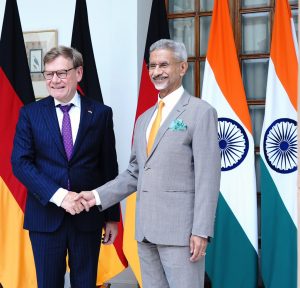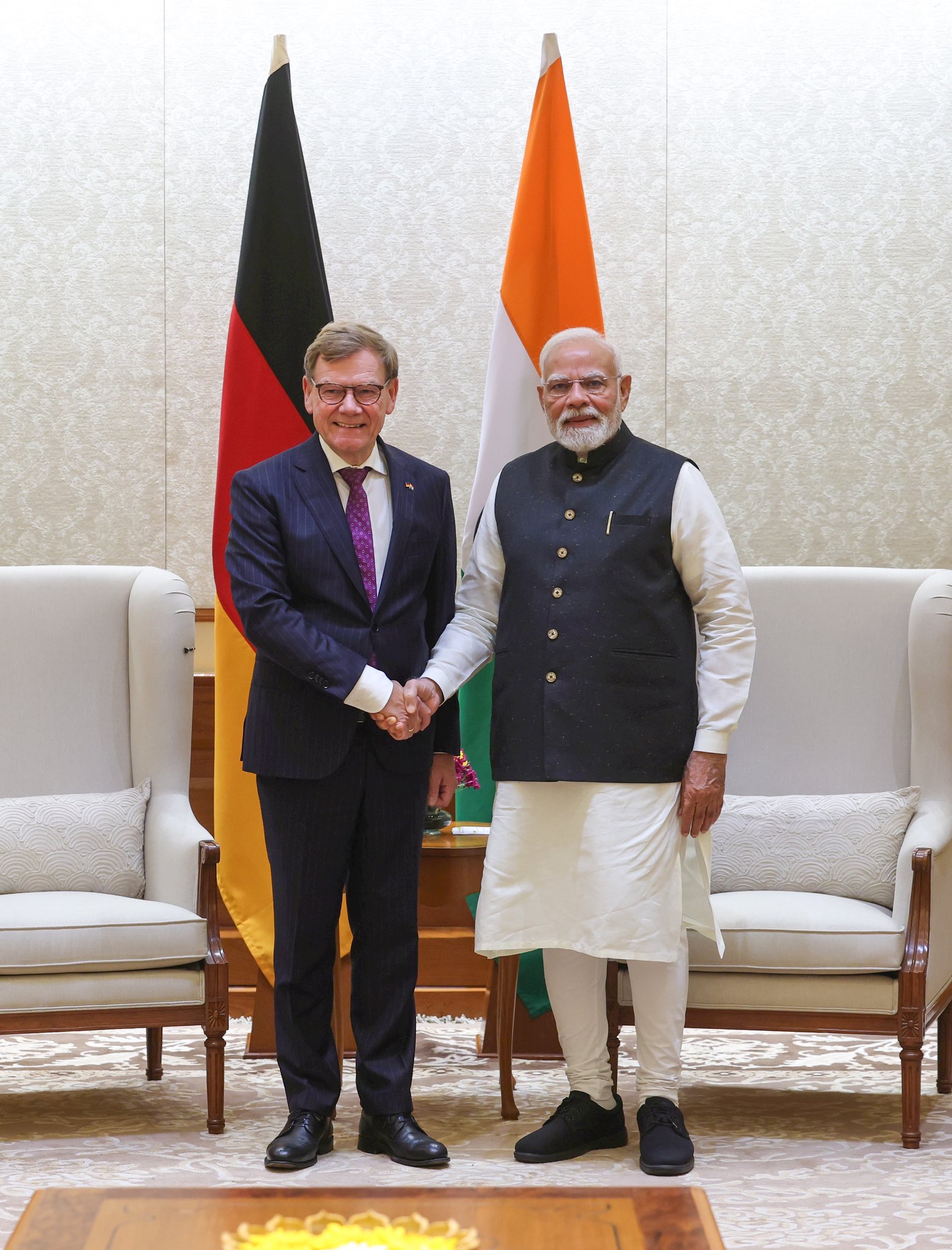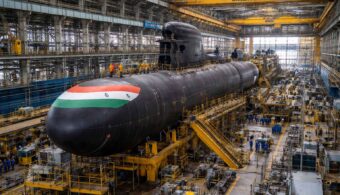German Foreign Minister Dr. Johann Wadephul concluded a two-day visit to India on Wednesday, signalling Berlin’s determination to elevate its ties with New Delhi across trade, technology, defence, climate, and global diplomacy. The visit, which began in Bengaluru on September 2 and concluded in New Delhi on September 3, was more than ceremonial. It combined strategic substance with political symbolism, positioning India as what Wadephul described as an “indispensable partner” in Germany’s foreign and economic strategy.
PM Modi and Dr. Wadephul Set Strategic Tone
The centrepiece of the trip was Dr. Wadephul’s meeting with Prime Minister Narendra Modi in New Delhi. Modi, reflecting on the 25th anniversary of the India–Germany Strategic Partnership, described the relationship as a springboard for the next phase of cooperation.
“As vibrant democracies and leading economies, we see immense potential to scale up mutually beneficial cooperation in trade, technology, innovation, sustainability, manufacturing and mobility,” the Prime Minister said.
He reiterated India’s commitment to a multipolar world order, called for reforms in global institutions, and extended a fresh invitation to Chancellor Friedrich Merz for an early visit to India.
FM Wadephul responded with a clear nod to security and economic priorities: “Our countries have taken good steps to expand our strategic partnership across the board, particularly in security and defence, economy and trade as well as skilled labour. We also greatly appreciate India’s call for a ceasefire in Ukraine.”
His remarks reflected Berlin’s wider expectation that India, with its global credibility and ties with Moscow, could play a constructive role in efforts to end the Ukraine conflict.
Trade and the EU–India FTA
 In delegation-level talks with External Affairs Minister Dr. S. Jaishankar, both sides identified trade as the most immediate area for acceleration. Bilateral commerce, currently estimated at nearly €50 billion, is targeted to be doubled in the coming years.
In delegation-level talks with External Affairs Minister Dr. S. Jaishankar, both sides identified trade as the most immediate area for acceleration. Bilateral commerce, currently estimated at nearly €50 billion, is targeted to be doubled in the coming years.
Dr. Jaishankar pressed for German support in expediting the India–European Union Free Trade Agreement (FTA). “We would like the [FTA talks] to move to a decisive conclusion in the coming days,” he said, adding that the deal could serve as a stabilising ballast for a world economy shaken by tariffs, sanctions, and volatility.
He assured his German counterpart that India would give “special attention” to any concerns German companies might face when investing or operating in the country.
Dr. Wadephul strongly backed the push. Calling India Germany’s “key trading partner in Asia,” he stressed that both sides must “lower barriers to market entry and align regulatory frameworks” to unlock greater flows of investment and technology. His discussions with Commerce and Industry Minister Piyush Goyal also covered cooperation in automobiles, clean technologies, semiconductors, pharmaceuticals, and digital innovation.
The talks also touched upon skilled migration — an area where Germany has an increasing demand and India a growing supply of talent. Berlin has been keen to facilitate easier pathways for Indian professionals, particularly in engineering, healthcare, and IT sectors, and Wadephul noted that smoother mobility would be a “win-win” for both economies.
Defence and Indo-Pacific Security
The strategic side of the relationship featured prominently in the New Delhi talks. Dr. Jaishankar spoke of an “uptick” in defence and security cooperation, noting Germany’s participation in India’s Tarang Shakti air exercises and naval visits to Goa.
At the core of discussions was the proposed submarine project between Mazagon Dock Shipbuilders Limited and Germany’s ThyssenKrupp Marine Systems, which would see India acquire six next-generation submarines with air-independent propulsion technology.
Wadephul took a firm line on regional security: “China’s increasingly aggressive behaviour in the Indo-Pacific is a cause for concern for both our countries. India and Germany are united in preserving a rules-based international order, which includes freedom of maritime trade routes.”
He also reiterated Germany’s support for India’s right to defend itself against terrorism, describing Berlin as a partner aligned with New Delhi’s security concerns. Both ministers agreed that defence industry linkages, co-development projects, and joint training exercises would be expanded further in the coming years.
Bengaluru: Innovation and Technology at the Core
FM Wadephul’s first stop was Bengaluru, where he inaugurated SAP’s second Experience Center at SAP Labs India. The new facility, one of only a few globally, highlights the city’s role as a hub for enterprise innovation.
He also visited the Indian Space Research Organisation (ISRO) and the Indian Institute of Science (IISc), spotlighting areas of collaboration such as artificial intelligence, digital public infrastructure, space technology, and sustainable urban development.
“Germany and India are great partners in the digital era,” Wadephul said. “Germany’s engineering and regulatory strengths are a perfect match with India’s vibrant innovation ecosystem and world-class talent.”
The discussions in Bengaluru also underscored the importance of digital regulation and cybersecurity — areas where Germany has strong policy frameworks and India is rapidly expanding. Both sides signalled intent to work together on shaping global norms around emerging technologies, particularly artificial intelligence.
Science, Sustainability, and People-to-People Bridges
The visit also commemorated 50 years of Indo-German scientific collaboration, with leaders agreeing to deepen partnerships between universities, research institutes, and industries. Both sides committed to closer cooperation in applied research, including life sciences, renewable energy, and industrial automation.
Climate and energy partnerships were another highlight. Green hydrogen, offshore wind, and biofuels were identified as priority sectors, building on Germany’s investments in India’s clean energy grid and India’s ambition to become a green hydrogen hub.
Mobility and education also gained fresh impetus. The two governments announced gratis visas for short-term student visits, making exchanges easier for schools and colleges. Dr. Wadephul emphasised the importance of education links, describing student exchanges as a “pillar of trust and connectivity” between the two nations. With over 60,000 Indian students already in Germany, Berlin’s commitment to facilitating smoother academic pathways was welcomed by New Delhi.
What the Visit Means
Dr. Wadephul’s September 2–3 visit in Bengaluru and New Delhi carried a message of convergence. The visit demonstrated political will to expand cooperation in the most critical sectors: trade, defence, technology, energy, climate, and education. It also confirmed alignment on global principles — a multipolar world order, freedom of navigation in the Indo-Pacific, counter-terrorism, skilled migration, and reform of international institutions.
As Jaishankar summed it up: “There are big changes underway in the world, and they make a very compelling case for a deeper, stronger, wider India–Germany relationship.”
What emerges from the visit is a renewed recognition of complementarity. India offers scale, talent, and market dynamism; Germany brings capital, technological expertise, and regulatory strength. Together, they appear ready to translate long-standing goodwill into tangible outcomes — with the India–EU Free Trade Agreement serving as the first test of how swiftly this partnership can adapt to a rapidly changing world.



